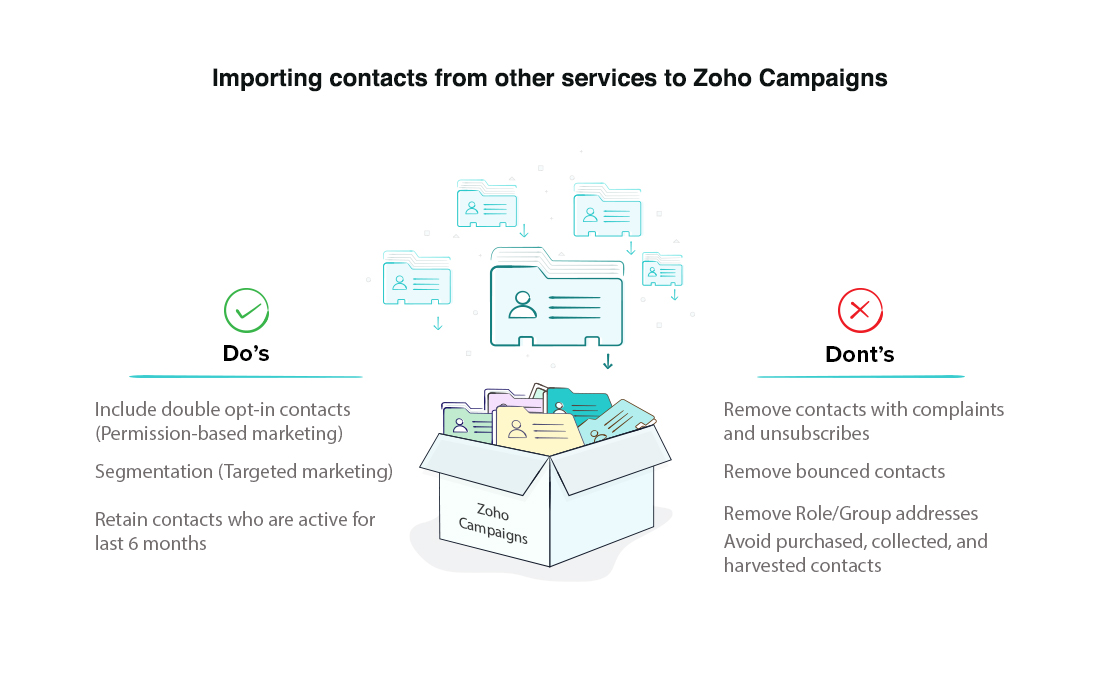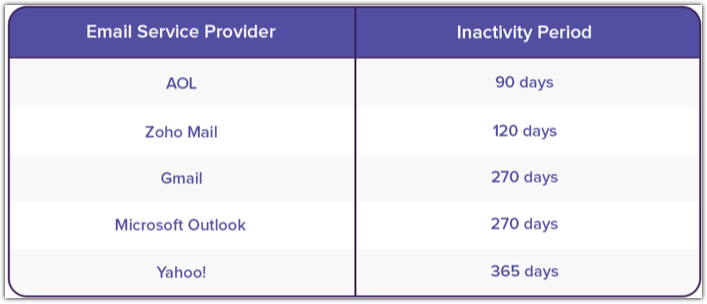Migrating to Zoho Campaigns
We know there are a lot of factors that go into selecting campaign software. We're happy that our product has proven itself to be versatile enough to be your choice. Now that you're here, let's go over a few things that you'll need to do to have good email deliverability.
- Importing mailing list
- Exclude bounces from your list
- Respond to complaints
- Respect unsubscribes
- Remove role/group addresses
- Re-engage inactive contacts
- Authentication with Zoho Campaigns
- Migration gap
- Sender email address
- System warmup
Importing mailing list
When you switch over, the first thing you'll want to do is to import your mailing list. You're starting fresh, so it's a good time to make sure your list is clean. A clean list means better deliverability and a better reputation with internet service providers (ISPs) and email service providers (ESPs). Better deliverability leads to more engagement and a higher ROI. The sections below will detail the best practices for maintaining list hygiene.

Exclude bounces from your list
Bounces occur when sent emails can't be delivered. If you've got bounces, your recipient system will send you an error message, detailing the reason for the bounce. Some bounced addresses may have been removed from your mailing list automatically, but in order to make sure you don't have any detrimental addresses in your list, keep the following advice in mind:
- When you export a mailing list from your previous service, make sure you only retained active contacts excluding unsubscribes, the do-not-mail registry, and bounces.
- If you haven't been in contact with your contacts for more than six months, chances are that some of those addresses might have become invalid. Use a reputable list cleaning service to identify and filter those contacts out.
- When signing people up for your list, employ a double opt-in subscription method. Permission-based marketing techniques like this prevent bounces before they can get into the mailing list.
Respond to complaints
When people receive emails even after they've marked the sender as spam, they're likely to register complaints about that sender. Make sure to remove contacts who've already designated your emails spam. Complaints can lead to abrupt degradation of your domain reputation.
If you had complaints in your previous service, they might be:
- Marked as spam: Your recipients might have marked your email as spam if they found the content irrelevant. If you send emails in spite of that, they may escalate the issue by raising complaints.
- Manual complaints: The recipient might have reported direct abuse complaints to your previous service, ISPs, anti-abuse teams of domain, ESPs, or various anti-spam services. These have a dramatic effect on your sender domain reputation. If you've received any complaints from contacts, remove them from your mailing list.
Respect unsubscribes
When recipients unsubscribe, it means they're not interested in your campaigns. Even if you've changed your campaign service, people who've unsubscribed still won't want to receive your emails, so avoid importing those contacts.
Remove role/group addresses
Email addresses such as admin@ and helpdesk@ are known as role or group addresses. Generally, these involve a company, department, position, or group of employees. Role of a person in a company may change anytime and there may be people in the group address who don't know you. These addresses are more likely to bring negative responses, so it's better to remove them from your lists.
Re-engage inactive contacts
If you import contacts from an inactive list, those addresses may either be invalid, or they may not recognize your email. Moreover, every inbox provider has its own specific inactivity period, after which such addresses will be marked invalid and converted to bounces, spam traps, or unsubscribes.
The inactivity periods of a few different ESPs are shown below:


For further references:
If an email address has been dormant for longer than the inactivity period, you can send re-engagement emails to confirm that the recipients are available and interested in receiving your newsletters. If they don't respond, remove them from your list.
Start sending your campaigns only after you're sure that your list is clean. This practice will help you maintain a good domain reputation and reach contacts who are actually interested in you.
Authentication with ZC
To maintain your domain reputation and prove to spam filters that you're not a spammer, you'll need to authenticate your domain with Zoho Campaigns. Authenticating your domain will allow our servers to accept and send emails on your behalf.
Migration gap
When you contact recipients after a long communication gap between software migrations, they may not recognize you, which can result in high bounces and spam complaints. When you're switching to Zoho Campaigns, after a long migration gap, send re-engagement emails to your recipients and inform them the reason for the lapse.
Sender email address
Switching services doesn't mean that you need to change your domain. You can keep the same email address and domain for Zoho Campaigns. If you want to use a new business domain, remind your recipients of previous conversations through email or footer information. A new domain may also have a low reputation in spam filters. Build it gradually with list segmentation (target marketing).
System warmup
When high volume of email messages are sent from a service for the first time, filters and recipient systems will search for anything spam triggering in it. It's not a good sending practice to begin with a high volume of emails for your first attempt, since it may lead to degradation of your domain reputation or your email going directly to a spam folder. Email throttling sends your messages to specific inbox providers gradually to build a positive footprint with the spam filters. When you regulate your email with throttling, you can avoid domain blacklisting and have a good response. One tip from Zoho Campaigns: Segment your list based on recipients' activity in the previous service and send your first campaigns to the ones who are most interested. That way, you'll can build a strong reputation with the ESPs. You can then gradually add other segments of your list.
Conclusion
We want your migration to Zoho Campaigns to be smooth and expect that your journey with us will be the one you've been hoping for. Maintaining your list regularly, following the tips above, can help you improve your domain reputation, leading to higher open rates, click rates, and business returns.
Related Articles
Migrating Data from Other CRMs
Follow the steps in this document to successfully migrate your data into Zoho CRM from another Zoho CRM account or a different CRM system. Data files from Zoho CRM or any other CRMs If you are planning to use a backup of data from Zoho CRM to import, ...Migrating to Zoho MarketingHub
We know there are a lot of factors that go into selecting campaign software. We're happy that our product has proven itself to be versatile enough to be your choice. Now that you're here, let's go over a few things that you'll need to do to have good ...Migrate from Zoho Campaigns to Zoho MarketingHub
Introduction Before you switch from Zoho Campaigns to Zoho MarketingHub, it is important to have a basic understanding of what this migration process is, how to proceed and most importantly, the do's and don'ts during migration. In this article, ...Migrating Data from Salesforce
Follow the steps in this document to migrate your Salesforce data into Zoho CRM. Data files from Salesforce The zip file you upload should contain all the files in CSV format and a folder named Attachments. This folder contains the source files used ...Campaigns
Getting Started New to Zoho Campaigns? Set yourself up to explore the product. Set up your account Once you sign up to Zoho Campaigns account, you need to add your company and personal information. Apart from this information, you can send invite to ...